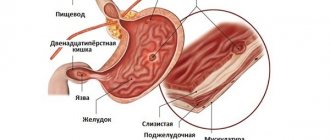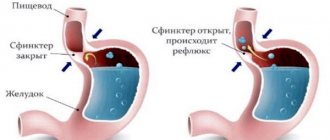Causes of nausea and heaviness in the stomach
Similar symptoms can occur not only after eating food, but also on an empty stomach. The causes of heaviness in the stomach and nausea are divided into several groups. A similar condition after eating food may occur due to:
- poor nutrition and quick snacks;
- consumption of large amounts of fats and spicy foods;
- overeating;
- consuming large amounts of food at one time;
- consumption of incompatible or long-digesting foods.
Among the reasons that provoke discomfort on an empty stomach are the following:
- taking certain medications;
- alcohol abuse and smoking;
- consumption of sugary carbonated drinks;
- disruption of the functioning of certain organs;
- stressful situations.
If unpleasant symptoms occur, you should definitely consult a doctor, as this may be a sign of dangerous dysfunctions in the functioning of many organs.
What is not recommended?
Unreasonable self-medication can harm your health:
- It is not recommended to heat the abdominal area;
- do not medicate with alcohol;
- at the first weakening of symptoms, you should not eat food that is difficult to digest;
- Do not wear clothes that compress your stomach after eating.
Nausea and heaviness in the stomach can indicate not only poor nutrition, but also serious problems in the digestive organs. Take care to balance your diet, and only a medical examination will help determine the cause of suspicious symptoms.
What diseases provoke severity?
Often this problem occurs as a result of overeating and consumption of highly fatty or fried foods. In addition, nausea and heaviness in the stomach occur due to various diseases, which include cholecystitis or pancreatitis. With pancreatitis, stomach pain, belching and nausea are additionally observed.
Nausea and heaviness in the stomach after eating can be the main sign of cholecystitis. During intestinal infections, severe vomiting, fever, diarrhea and headache are additionally observed.
In addition, such a condition may be one of the signs of pregnancy in a woman. That is why every woman should definitely visit a gynecologist, especially if there is no menstruation. The causes of heaviness in the stomach and nausea may be associated with myocardial infarction, stagnation of blood in the liver. If you suspect this disease, qualified medical assistance is required. Biliary tract pathologies should not be ruled out.
Gastritis, which is characterized by the formation of an inflammatory process, can provoke nausea and heaviness in the stomach. This disease occurs as a result of malnutrition or the penetration of pathogenic microorganisms. Many patients additionally complain of belching, stomach pain and vomiting.
Among the main reasons is the presence of a stomach ulcer. This disease is characterized by severe pain in the stomach, especially at night, and frequent vomiting. The disease is characterized by seasonal exacerbation. Weakness, nausea and heaviness in the stomach are observed in the presence of malignant tumors. This pathology can be asymptomatic for a long time. Sometimes, due to cancer, there may be diarrhea and periodic vomiting. As the disease progresses, severe severe pain occurs, as well as constant vomiting.
The development of chronic pancreatitis is caused by abnormal processes occurring in the pancreas. This condition can be triggered by alcoholism, malnutrition and stagnant processes in bile. In addition to a feeling of heaviness in the stomach and nausea, symptoms such as vomiting and flatulence occur. Sometimes there may be pain in the navel and left hypochondrium. One of the main signs is light-colored feces, as it contains a lot of undigested fats.
Hepatitis is characterized by dull pain on the right side, diarrhea, heaviness in the stomach and nausea. In addition, a certain yellowness of the skin is observed. With chronic cholecystitis, the patient suffers from bilious vomiting, sour belching, nausea, heaviness in the stomach and pain in the right side. The stool also changes its consistency.
Pathological causes
The second group - pathological factors - includes causes associated with diseases of internal organs - the stomach and gastrointestinal tract. Acute or chronic disorders:
- Gastritis is an inflammation of the gastric mucosa; it can be hyperacid (when the acidity of gastric juice is increased) and hypoacid (with low acidity). A distinctive feature of hyperacid gastritis is persistent heartburn, which occurs as a result of the reflux of gastric juice into the esophagus. With gastritis with low acidity, slow digestion is observed. The patient may be bothered by belching of food masses and a feeling of swelling.
Gastritis in humans - Duodenitis: inflammation of the duodenum.
- Cholecystitis: diseases of the gallbladder and ducts. A similar disease manifests itself as gastritis and severe heartburn. Heartburn with persistent bitter taste.
- Hepatitis: inflammation of the liver. The manifestations of the diseases are different, depending on the type of hepatitis: A, B, C, D, etc. A common symptom is an increase in the size of the liver, felt upon palpation in the right hypochondrium. The most severe form is hepatitis C. It is called “gentle death.”
- Pancreatitis: disturbances in the functioning of the pancreas. Pancreatitis turns into pancreatic necrosis - the cause of disability and death.
- Enteritis, colitis, proctitis: diseases of the intestines. The diseases are manifested by persistent disturbances in gas formation. Gases accumulate in the intestinal cavities and have difficulty finding a way out. A distended intestine is a severe pain test for the body.
Chronic diseases take advanced forms, leading to neoplasms on the walls of the tract (polyps, tumors, fecal growths, etc.) - if not properly monitored, further growths lead to serious consequences and death.
In addition to diseases of the digestive organs, there are a number of other pathologies that can cause deterioration of the condition, heaviness in the stomach, nausea, vomiting, and increased gas formation:
- Infections. Penetrating into the human body, they multiply intensively, take away useful substances, and in return leave behind toxic products of their vital activity. The first sign of infectious inflammation is diarrhea and constant uncontrollable vomiting.
- Oncological neoplasms. Increasing in size, the tumor is able to oppress neighboring organs, changing and completely destroying their function.
- Diseases of the cardiovascular system: nausea is the first symptom of increased blood pressure, the threatening onset of a heart attack or stroke.
- Hormonal disorders: diabetes of various etiologies. Symptoms indicate the approach of hypo- or hyperglycemic coma. Victims experience noise in the head, weakness, decreased body temperature, sweating, and absent-mindedness.
- Diseases of the genitourinary system: Nausea, vomiting are frequent signs of irradiation (rebound) of pain from a diseased organ to a healthy one - a stone coming out of the left-sided kidney or an inflammatory process in the left appendage of a woman becomes the instigator of troubles from the stomach due to the adjacent location of the organs.
- Disorders of the nervous system: vomiting indicates an oncoming epileptic seizure, nausea occurs after severe nervous overstrain (death in front of our eyes, fear, exams, breakup of relationships).
- Trauma and postoperative changes. If the integrity of an organ is violated, its full functionality is also impaired. With internal bleeding, reflex vomiting of blood and other liquids that have filled the stomach is observed.
Special conditions for the appearance of problems associated with dysfunction of the gastrointestinal tract include the onset of pregnancy, the approach of menstruation, and menopausal manifestations in women. In the early stages of pregnancy, the developing fetus is perceived as a foreign body - the woman’s immune system reacts with toxicosis, and subsequently the child growing in the uterus compresses the organs located near the uterus, limiting normal functioning. When menstruation approaches, hormonal changes play a decisive role.
Heaviness in the stomach and fever
Nausea, heaviness in the stomach, bloating, and fever - all this may indicate the presence of a myocardial infarction, so immediate medical attention is required. In this case, there may additionally be vomiting, but no painful sensations are observed during palpation. But there is a noticeable deterioration in well-being, and the mouth feels very dry.
In addition, nausea and heaviness in the stomach against the background of an increase in temperature may be a sign of inflammatory processes in the stomach and intestines. Such symptoms are characteristic of many diseases of the digestive system, in particular poisoning. In addition, these signs can be observed in diseases of the liver, kidneys and pancreas.
How to alleviate the condition?
How to cope with unpleasant symptoms before consulting a doctor? The following recommendations will help overcome nausea and heaviness in the stomach after eating:
- you should not go to bed to rest . A horizontal position after eating can cause heartburn, which will only make you feel worse. A leisurely walk in the fresh air will help get rid of the feeling of fullness in the stomach;
- drink a glass of unsweetened tea with mint , which will help improve digestion;
- you can take digestive enzymes to alleviate the condition (Motilium, Mezim, etc.);
- limit your diet to a gentle diet excluding fatty and spicy foods;
- if you suspect poisoning, take activated charcoal .
And do not forget that health does not forgive carelessness - if symptoms recur, seek help from a qualified specialist.
Causes of nausea and abdominal pain in adults and children.
How to do a cleansing enema at home? You will find the answers in this article.
Advantages and disadvantages of disposable enemas - https://vashjeludok.com/kishechnik/k-lechenie/odnorazovye-klizmy.html
Main symptoms
If there is heaviness in the stomach and nausea, there may be certain corresponding symptoms, which mainly depend on the factors that provoked the disease. Among the main symptoms are the following:
- painful sensations in the abdomen of varying intensity;
- vomit;
- bloating;
- heartburn;
- diarrhea followed by constipation.
Poor quality food, as well as disorders of the nervous system, prolonged fasting can provoke a feeling of fullness in the stomach. In addition, in some cases there is an increase in temperature, severe weakness, dizziness, and loss of appetite. Heaviness can appear in the morning or evening, which is caused by overeating right before bed, so a person wakes up in the middle of the night and feels very bad in the morning.
Hepatitis
Hepatitis comes in different types.
But it is always liver damage due to pathogenic viruses or toxic effects. With gastritis, a person also experiences a lack of appetite, nausea and heaviness after eating, weakness and fatigue. And he may not suspect the cause of this condition. As the disease progresses, the skin turns yellow, as do the whites of the eyes, and the urine becomes dark in color. And here it is already difficult not to notice the development of hepatitis, although it can be confused with an exacerbation of cholelithiasis, when a person also turns yellow due to blockage of the bile ducts with a stone.
Carrying out diagnostics
To determine the cause of constant heaviness in the stomach and nausea, you need to contact a doctor, who will refer you for an examination. It should be carried out by a gastroenterologist who can make the correct diagnosis based on the collected medical history. To determine the main cause of the pathological process, you need to take blood and urine tests, and also do a cardiogram.
A complete blood count helps assess hemoglobin levels, since when it decreases, anemia develops. If a disease of an infectious nature is suspected, the number of leukocytes is assessed, and if there is an elevated ESR, a tumor in the stomach may be observed.
A biochemical blood test helps assess the level of liver parameters, which increase with liver pathologies, which is typical for pancreatitis. Ultrasound diagnostics of the abdominal cavity allows you to assess the size and structure of the liver, the presence of stones in the gall bladder, as well as the features of the pancreas, which allows you to make a correct diagnosis and determine the presence of problems with the digestive system.
Abdominal tomography is performed if there is a suspicion of a malignant tumor of the stomach, intestines or liver. And also a similar research technique makes it possible to determine its localization and the extent of spread of metastases to neighboring organs.
After an appointment with a gastroenterologist, you need to conduct an endoscopic examination of the stomach, an X-ray examination of the digestive tract and ultrasound diagnostics of the abdominal cavity.
Based on the examination, the doctor will be able to make the correct diagnosis and prescribe appropriate treatment. However, it is worth noting that the disease may be endocrine or neurological in nature, which is why consultation with other specialists may be required.
Diagnostics
To identify the provoking factor of severity and pain in the stomach, it is necessary to carry out a whole range of diagnostic measures. Thus, establishing a correct diagnosis includes:
- a clinician's examination of the patient's medical history and life history - this will indicate possible causes of constant heaviness in the stomach, especially in the presence of chronic ailments;
- a thorough physical examination aimed at palpation and percussion of the abdomen, measuring temperature and identifying other clinical manifestations;
- detailed patient interview;
- clinical analysis and blood biochemistry - to determine signs of a pathological process and evaluate its composition;
- general urine analysis;
- microscopic examination of feces;
- specific breathing tests;
- radiography and ultrasound of the peritoneum;
- CT and MRI;
- FGDS and gastroscopy;
- gastric biopsy - this is necessary to confirm or exclude the presence of a malignant neoplasm.
In some cases, you will need to consult an obstetrician-gynecologist (if the patient is a pregnant woman) and a pediatrician (if heaviness in the stomach manifests itself in a child or teenager).
After studying the results of all diagnostic examinations, the doctor will draw up a diagram of what to do to get rid of such symptoms.
How to quickly eliminate heaviness
Isolated cases of heaviness and nausea can be eliminated in fairly simple ways. To achieve a positive result, you need to massage your ankles and feet, as this area contains many active points that contribute to the normal functioning of the digestive system. You can drink weak tea with lemon. It helps stimulate the digestive system.
To eliminate bloating, you need to massage your stomach for several minutes, as this will normalize the digestive process. To quickly improve your well-being, you can take 1-2 tablets of Festal or other similar drugs, since they contain digestive enzymes. However, such a remedy should not be used often, as it can cause deterioration in the functioning of the liver and pancreas.
Carrying out treatment
Treatment of heaviness in the stomach and nausea must be comprehensive, since only this guarantees the most positive result. The method of therapy should be selected only by a qualified doctor.
You must follow a special diet. It is necessary to exclude fatty, spicy, fast food, and fried foods from food. In this case, all these restrictions help normalize the patient’s well-being. Constant stress also negatively affects the functioning of the stomach, so it is imperative to avoid situations that traumatize the psyche. If the patient’s occupation is associated with frequent stressful situations, then you need to consult a psychologist and take a course of sedatives to eliminate the negative effects of stress on the digestive organs. In addition, eliminating stress is beneficial not only for the digestive system, but also for blood vessels and the heart.
If the cause of stomach pain, heaviness and nausea is pregnancy, then you should definitely consult a gynecologist who will tell you how to properly eliminate the unpleasant symptoms.
Eating small portions will help you feel better. If a dangerous disease is detected, it is imperative to undergo complex therapy using various drugs. All medications must be prescribed only by the attending physician. Additionally, you can use traditional medicine.
Treatment methods
If a person experiences unpleasant symptoms, he should not self-medicate, as improper use of medications can lead to the development of serious complications. In such a situation, you need to go to a hospital and make an appointment with a gastroenterologist. A highly specialized specialist will examine the patient and prescribe a number of laboratory and instrumental tests. Once the cause of belching and nausea is identified, a course of drug therapy will be prescribed.
In cases where the cause of unpleasant symptoms is associated with gastrointestinal pathologies, specialists prescribe medications to patients that have the following pharmacological effects:
- enzyme-containing medications;
- antispasmodics;
- hormone-containing medications;
- drugs that have a sedative effect;
- choleretic drugs;
- antibiotics.
In parallel with the course of drug therapy, patients will have to limit their diet. They should eat up to six times a day in minimal portions. The daily menu should be free of all harmful foods.
In cases where the cause of unpleasant symptoms lies in poor nutrition, experts will give patients the following recommendations:
- You should completely stop drinking alcoholic beverages and smoking.
- After each main meal, you should take short walks in the fresh air.
- It is recommended to stop chewing gum and drinking coffee on an empty stomach.
- People should not have conversations during meals.
- The process of absorption of food should be very slow so that each piece can be chewed thoroughly.
- All carbonated drinks should be completely excluded from your diet.
- You can use herbal decoctions to normalize digestive processes.
- People should avoid stressful situations. If they experience disorders of the central nervous system, they should contact a neurologist who will prescribe sedatives.
- Experts recommend that people do daily exercises that will help their digestive processes.
- Patients should get rid of the habit of overeating and eating at night.
Medications
If adjusting your diet and lifestyle does not bring relief, then you need to choose the right medications to help get rid of heaviness in the stomach. It is necessary to take into account that it is prohibited to use medications regularly, as this can cause disruption of the functioning of the pancreas and stomach problems. To alleviate general symptoms, you need to take medications such as:
- "Renny";
- "Almagel";
- "Gastal";
- "Mezim."
When dysbacteriosis occurs, you can use "Acepol". If the patient has a stool disorder and hard feces, then a mild laxative such as Fitolax should be used.
The use of traditional medicine
Together with medications, you can use traditional medicine that will help get rid of the negative manifestations of diseases. The best and most effective include:
- tea with mint, lemon balm or chamomile;
- infusion of St. John's wort;
- buckwheat grain.
You can cope well with an attack of nausea with the help of lemon. However, this remedy is not recommended for use in cases of increased stomach acidity, gastritis and ulcers. Nettle decoction helps normalize digestive processes. All these remedies can be used only after consultation with a gastroenterologist and determining the absence of an allergic reaction to herbal ingredients.
Prognosis after treatment
The prognosis after therapy is quite favorable, but only if treatment is started in a timely manner. Similar symptoms may occur due to the consumption of certain foods. In this case, you just need to exclude them from the diet and your health will immediately improve.
If deterioration in well-being is observed against the background of diseases of the digestive system, then you should definitely consult with your doctor. With proper and timely treatment, the prognosis is favorable. If therapy is not carried out in time, the situation can worsen significantly.
When to see a doctor
You should definitely consult a doctor if you have heaviness in the stomach, as well as additional signs such as:
- frequent vomiting;
- heat;
- frequent and loose stools that are green or watery;
- sudden weight loss, loss of appetite, pallor and fatigue;
- sharp pain in the abdomen.
If the patient has ruled out all possible causes of the disease, but discomfort still continues, then you need to consult a doctor and undergo a comprehensive examination to determine the cause.
Carrying out prevention
You can normalize your health by taking preventive measures. You definitely need to closely monitor your daily diet. It is important to use fractional meals. Prolonged fasting or overeating should be avoided. Follow a certain daily routine and consume food only at the appointed time. This will make the process of digesting food easier.
It is recommended to have dinner no later than 2 hours before bedtime. You need to eat calmly and very slowly. It is not recommended to eat in stressful situations. If you have dyspepsia, you should stop smoking. The food consumed should not be too hot or cold, as it will irritate the gastric mucosa.
Discomfort can be eliminated with sufficient physical activity. You need to devote time to running, long walks, dancing, and playing sports.










